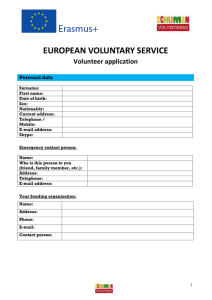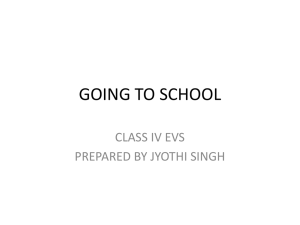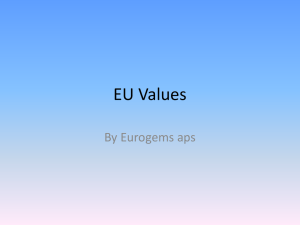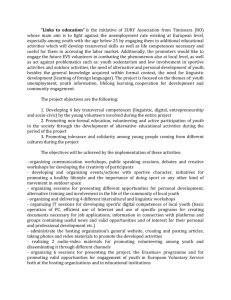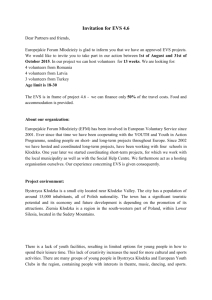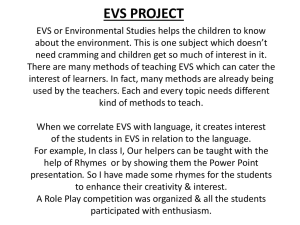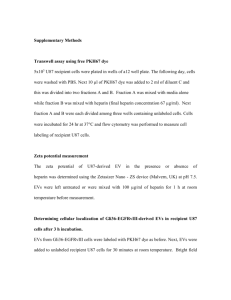The Dream Journey - Salto
advertisement
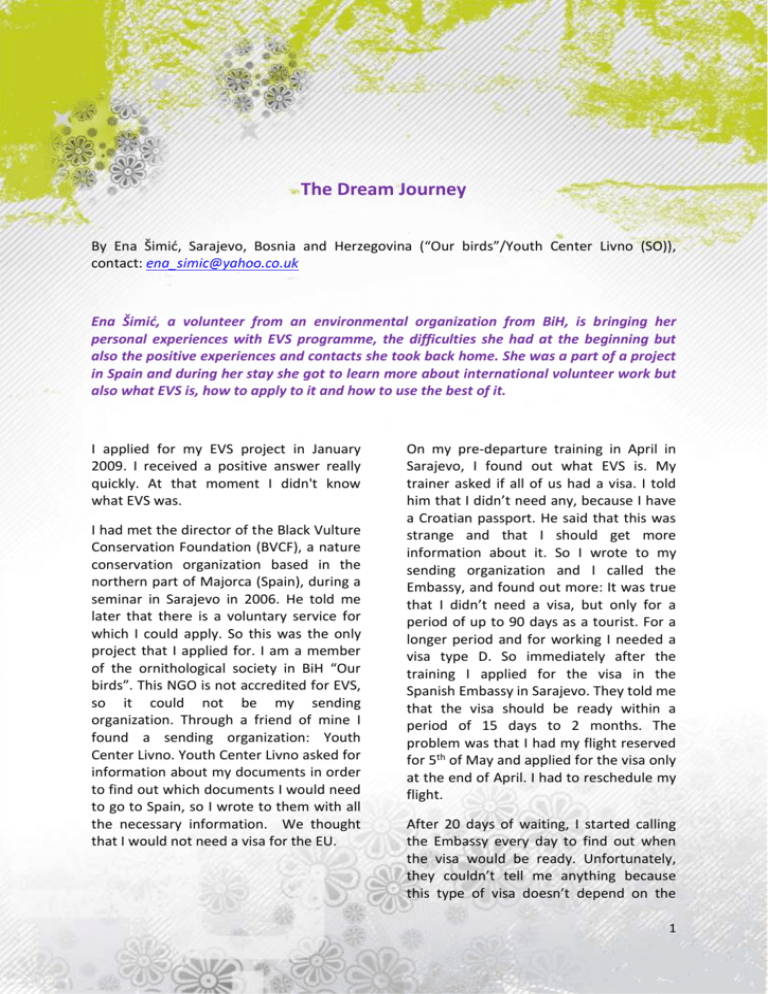
The Dream Journey By Ena Šimić, Sarajevo, Bosnia and Herzegovina (“Our birds”/Youth Center Livno (SO)), contact: ena_simic@yahoo.co.uk Ena Šimić, a volunteer from an environmental organization from BiH, is bringing her personal experiences with EVS programme, the difficulties she had at the beginning but also the positive experiences and contacts she took back home. She was a part of a project in Spain and during her stay she got to learn more about international volunteer work but also what EVS is, how to apply to it and how to use the best of it. I applied for my EVS project in January 2009. I received a positive answer really quickly. At that moment I didn't know what EVS was. I had met the director of the Black Vulture Conservation Foundation (BVCF), a nature conservation organization based in the northern part of Majorca (Spain), during a seminar in Sarajevo in 2006. He told me later that there is a voluntary service for which I could apply. So this was the only project that I applied for. I am a member of the ornithological society in BiH “Our birds”. This NGO is not accredited for EVS, so it could not be my sending organization. Through a friend of mine I found a sending organization: Youth Center Livno. Youth Center Livno asked for information about my documents in order to find out which documents I would need to go to Spain, so I wrote to them with all the necessary information. We thought that I would not need a visa for the EU. On my pre-departure training in April in Sarajevo, I found out what EVS is. My trainer asked if all of us had a visa. I told him that I didn’t need any, because I have a Croatian passport. He said that this was strange and that I should get more information about it. So I wrote to my sending organization and I called the Embassy, and found out more: It was true that I didn’t need a visa, but only for a period of up to 90 days as a tourist. For a longer period and for working I needed a visa type D. So immediately after the training I applied for the visa in the Spanish Embassy in Sarajevo. They told me that the visa should be ready within a period of 15 days to 2 months. The problem was that I had my flight reserved for 5th of May and applied for the visa only at the end of April. I had to reschedule my flight. After 20 days of waiting, I started calling the Embassy every day to find out when the visa would be ready. Unfortunately, they couldn’t tell me anything because this type of visa doesn’t depend on the 1 Embassy in Sarajevo but a Ministry in Madrid. The worst was that my project had already started on 6th of May and that I lost an entire month of my project. In the end, I received my visa after 44 days, and I rescheduled my flight 4 times in total. The first days at work were tough. The BVCF mainly deals with reinforcement and reintroduction of vulture populations in Europe. Also it implements projects related to raising awareness and education about the environment. We worked a lot and did mostly physical work. Every person was given a specific responsibility in the Centre. Gwendoline and I were working with the animals (vultures, dogs, horse, sheep, etc.) and Mate was working with Tim, a volunteer gardener from the U.K. Also the language took a lot of our energy: We had to talk the whole day in Spanish, which was difficult at the beginning. Anne helped us a lot at work because she had started her EVS project in January 2009. Finally, on 11th of June I arrived at Palma de Majorca airport. My tutor came to pick me up. I could speak some Spanish, but not very well because I had never actually spoken it. So my first language upon arrival was English. My tutor only speaks Spanish and Catalan, which made our communication a bit difficult at the beginning. He drove me to my new home in Campanet, which is a village of 2500 inhabitants in the North of the island near the mountain chain Sierra de Tramuntana. After three weeks, the responsible for environmental education at the Centre gave me a new task: giving presentations about the Foundation for visitors in English and Spanish. This experience helped me to improve both languages. Anne from the U.K., one of my roommates, was waiting for me in the house. The other two volunteers were in Barcelona at the on-arrival training. The next day Anne went to Barcelona to join them and I was left alone in the new house, in a foreign country. I felt so alone and scared! After three days they came back. I had been really looking forward to meeting Gwendoline from France and Mate from Hungary. Finally the house was full of positive energy and smiling people. After a month, Anne returned home and Nina came, a great girl from Germany. Nina and I were working on the webpage of the Foundation. Through this work, I learnt a lot about the natural and historical values of Majorca. After two months Nina returned home and two new volunteers came: Barði from Iceland and Natalia from Spain. Natalia worked on a different project, sustainable tourism, and Barði was working with Gwendoline and me. 2 On both seminars I met a lot of people coming from different countries. What connected us was that we were all volunteers in a new country, ready to learn about Spain, but also to tell people where we came from and how great our own countries are. We shared our experience, talked about our fears and problems and tried to help each other. During the last month of my volunteer work, the project director of the BVCF, Juan José Sánchez Artés, offered me to work on preparing a project in BiH. I learned a lot with this experience and it will be very useful for my future work in BiH. The project is about work with state institutions in BiH on environmental issues and education. I helped with my knowledge about the political and environmental situation in B&H. I learnt how an application for a project looks like and how to write it. At the beginning of November a new group of three volunteers arrived: Giada (Italy), Beatrix (Hungary) and Mathieu (France). The director of the Foundation, Evelyn Tewes, asked Gwendoline and me, if we could work three more days after the end of our project to introduce the new volunteers to their future work. We accepted with pleasure. On 16th of November I left Majorca both sad and happy. Sad because I left my life and friends in Mallorca, but also happy because I was going to see my family and friends at home. I participated in two training sessions for EVS volunteers in Spain: the on-arrival training in Torremolinos (Malaga) and mid-term meeting in Alborache (Valencia). During my volunteer project in the BVCF I had a wonderful time. The BVCF team is great, full of people with professional knowledge and positive energy. They were always ready to help us with every kind of problem we had. The other volunteers I was living with were very kind and communicative. I learnt a lot about their different cultures and I taught them about mine. We made panels with important words in 7 languages (Spanish, English, French, Italian, Hungarian, Bosnian and German) and put them up on a wall of our house. We discussed a lot about the differences and similarities between our cultures and languages. Of course, we had problems too. At the beginning we didn’t speak Spanish very well, so we often encountered communication problems. I learnt to be really patient and to try to be understanding with people. I’m a biologist and this experience helped me a lot for my future professional plans. I learnt to work with vultures, their behaviour and their position in the ecosystem. Also I learnt how to prepare projects and how to give oral presentations in front of people. My EVS experience was really useful for my professional career and “Our birds”. Through this project I met a lot of 3 biologists from Spain, and these contacts are going to be useful for future projects of “Our birds”. As I proved that I’m a valuable co-worker, the project director of BVCF is really interested in future cooperation with me and “Our birds”. The EVS programme is a great opportunity for every young person who is willing to experience a new culture and a different life. Definitely you will need a little courage to do an EVS project. Sometimes it is not easy when you are all by yourself in a foreign and completely different country with a language you might not understand. On the other hand, be sure that you will have the time of your life! You will meet friends for your whole life. These kinds of friendships are really strong. You will also have the opportunity to learn a new language and culture and visit a different country. EVS is a “MUST DO” for every one of you!!! Photos: Ena Šimić Published by: SALTO South East Europe Resource Centre MOVIT NA MLADINA Dunajska cesta 22, 1000 Ljubljana, Slovenia Tel: + 386.1.430 47 47 www.salto-youth.net/see February 2011 4

